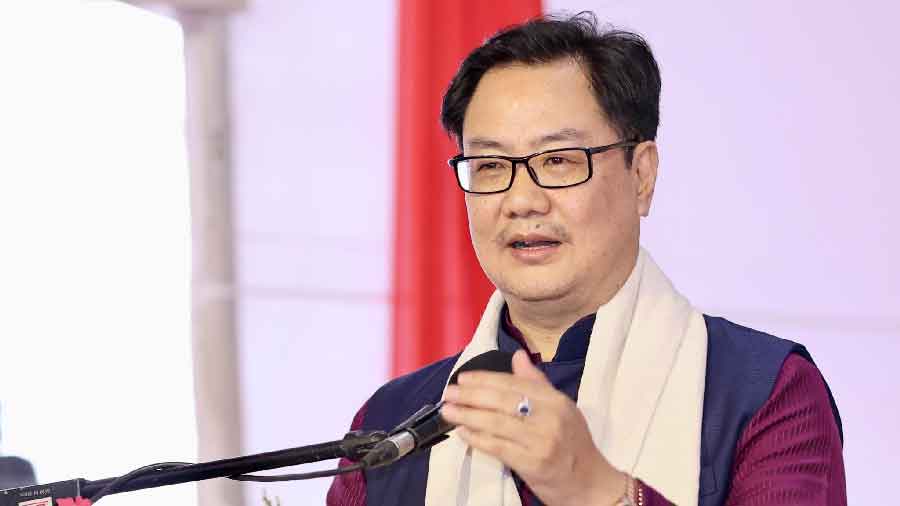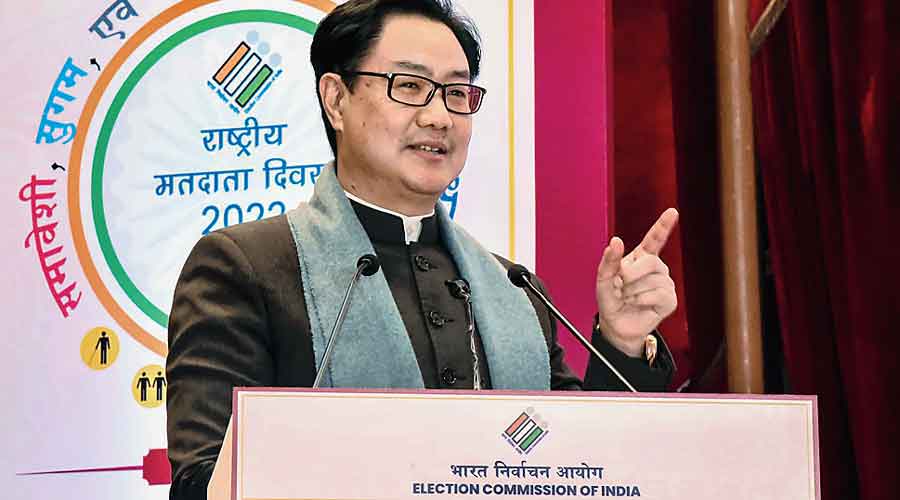Union law minister Kiren Rijiju has said the collegium system of appointing Supreme Court and high court judges is “opaque” and involves “intense politics” on a scale higher than anything that politicians indulge in.
He advocated the creation of “a better system”, regretting the apex court’s quashing in 2016 of the National Judicial Appointments Commission (NJAC) that gave the government a say in judges’ appointments.
The Union minister also declared himself “upset” at the court’s recent decision to indefinitely stay all proceedings under the sedition law.
“In the (judges’) selection process, there is a lot of politics. The politics we politicians do is nothing before the politics which happens inside the judiciary. It is not visible,” Rijiju said at the India Today Conclave in Mumbai earlier this week.
“It is intense politics there because they (judges) are part of the selection process. They have to do a lot of politicking. So, you tell me, judges should spend more time on delivering justice to people or more time in the administrative process?”
Under the collegium system, the Chief Justice of India (CJI) and the four next senior-most Supreme Court judges recommend judges for appointment to the apex court. The government can send a recommendation back for reconsideration but must accept it if reiterated by the collegium.
The CJI and the three next senior-most judges select judges for the high courts after obtaining initial recommendations from the collegium of the high court concerned, made up of the high court’s chief justice and the next two senior-most judges.
Rijiju said that only in India did judges appoint judges, leading to the pendency of cases as senior judges were busier with the administrative process of picking up judges.
“When there is a system which is not transparent, which is opaque, then if the concerned minister does not speak out, who else? So basically I am stating a fact which is a thinking and reflection of the lawyers’ community and judges also,” he said.
Rijiju regretted that the court had struck down the NJAC without providing an alternative mechanism, and persisted with the collegium system. Apart from the CJI and two other senior-most judges, the NJAC had as its members the Union law minister and two eminent personalities chosen by a panel of the Prime Minister, CJI and the leader of the Lok Sabha Opposition.
“No system can be 100 per cent. But we should definitely look for a better system and better practice…. When the Supreme Court struck it (NJAC) down, then the Supreme Court should tell what is the alternative option,” he said.
“They did not tell the better option, but they felt the old collegium system should continue. I am not convinced with the present system. I spoke it out. Judges agree with me because what I am saying is fact and not contrary to their belief and understanding.”
Rijiju said that judges lack the information and expertise required to select judges, compared with the government which has more resources.
“If you see the collegium system, they decide names on the basis of their understanding of the names and also the consultees. Who are the consultee judges? Supposing you are a consultee judge (a judge acquainted with the candidate’s home state and his antecedents) you will recommend only those names known to you, who are your acquaintances, otherwise you won’t be recommending someone whom you don’t know,” the law minister said.
“So, the basic fault in the system is that you won’t recommend even if he is qualified, fit or good enough and (the) perfect person to be a judge in a high court and the Supreme Court. But you can’t recommend because you don’t know.”
Rijiju underlined that even under the present collegium system, the government does due diligence on the basis of intelligence reports and other information that the judges lack access to.
“That is why we must come together and combine — that is what the NJAC talked about,” he said.
Sedition ruling
Rijiju said the Supreme Court should not have frozen all proceedings under the sedition law, particularly when the Union government had pleaded that it was about to review and make changes to the colonial-era law.
Members of civil society and activists have questioned the continuation of the sedition law and flagged its misuse by governments against critics and political opponents.
“(On) the sedition law, we said, we are making some changes. Despite that the Supreme Court struck down,” Rijiju said.
“I was very upset by it. These are the matters that really upset me. If we are adamant on any subject and not listening to the judiciary, the judiciary can come down heavily,” he added.
“When we have stated that we are taking a review... (that) we will come back with better provisions of law — despite this if they pronounce a law, it is not a good thing. That is why I reacted at that time also (saying) that there is a Lakshman rekha and let us not cross it. Lakshman rekha is in the interest of the nation.”
The Union minister said he was not being critical of the judiciary; rather, he was talking about the “thinking of the people of India, reflection of the people of India”.
Oral comments
Rijiju referred to the practice of some judges making oral observations that are not part of their judgments.
“There is a convention that a judge should speak through his judgment. Oral observations have no bearing. So, my advice to judges is, ‘Don’t come to a situation where you will invite criticism. Don’t make unnecessary observations’,” he said.
“We (the Centre) respect the judiciary and we also believe in complete independence of judiciary. Independence of judiciary should be respected and protected. Constitution is supreme. If everybody sticks to their respective role, this turf war and battle of supremacy (will disappear).”
Judges praised
Rijiju praised judges for their hard work and rejected allegations that judges go on vacation too often.
“Judges are doing so much work. No judge in the world will be doing so much work which Indian judges have to go through. Each judge — whether (in the) Supreme Court, high courts, or subordinate courts — they deal every day with 50-60 cases,” he said.
“Now I get complaints that judges go on holidays three times in a day and why should judges get so many holidays? But there I tell them that the amount of work Indian judges do, they need a break. Otherwise, they will break down.
“The judges do so much work…. That is why I have always been saying that they must not (attend) to anything else (appointment of judges).”
To a question, Rijiju said there was no proposal to increase the retirement age for judges, which is 65 for Supreme Court judges and 62 for high court judges.












